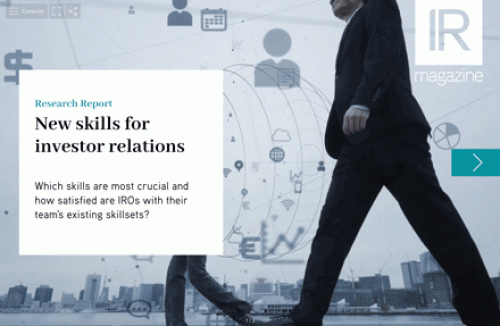An examination of the opportunities for the former investment bankers and analysts who are turning to careers in investor relations
The idea of stepping into a pair of IR shoes has never been more appealing. Today’s turbulent market, the bite of the credit crunch and the emerging respect for a reasonable work/life balance have all combined to make the in-house job market more competitive than ever.
Compared to the slavery of investment banking, the IRO’s hours are pretty predictable and balanced. From a work satisfaction perspective, a common thread emerges from analysts interviewed for IR roles: the desire to be able to fully ‘drill down’ into a company after years of having to rely on publicly available information.
Many investment bankers making the jump are surprised by the IR role at first. They find IROs more plugged into senior management at a strategic level than expected. Steve Trowbridge, a former equity analyst who became senior IRO at Thomson Reuters, admits that he had to change his preconceptions of IR once he crossed the bridge. It took him most of a year to fully acclimatize to the non-competitive environment and to feel he was really adding value.
Trowbridge attributes his early success in the role, and relatively straightforward adjustment period, to a comprehensive induction process. His honest approach and candor about his ambitions to move beyond the IR role paid dividends; within 18 months he was promoted to a head of finance role.
Similarly, Wray Barber, head of IR at FTSE 250 mining group Hochschild, underestimated the profile she would assume in her new role. ‘I didn’t expect to be presenting to so many CEOs and company presidents or representing the company single-handedly at more and more international mining sector conferences, where it has become crucial to have a presence,’ she explains.
Barber stepped into the role at Hochschild fresh from the equity capital markets division at JPMorgan Cazenove, where she worked on the company’s IPO. She was attracted by the idea of establishing an IR function from scratch, allowing her entrepreneurial spirit to shine. Barber’s focus has been half-internal and half-external because Hochschild’s head office is in Peru. By default, she is the primary port of call for investors.
Fresh challenges
For those who have decided to switch sides and build a corporate career, an IR role is a good place to start. IROs are positioned close to the senior management team, privy to decision making on board-level strategy and high-level finance issues. Many relish the proximity that travelling with senior management gives them. As one put it: ‘You get to see what makes them tick.’
Of course, IR is a 360-degree role: you are involved with board-level strategic planning of a corporate and financial nature, and you are also the company’s spokesperson, representing senior management to potential investors and other sophisticated minds in the investment community. Some, though by no means all, would argue that effective and fully empowered IROs also have the potential to influence a company’s share price.
Some senior corporate management teams are surprised to find analysts and investment bankers ready to forgo City bonuses in exchange for the corporate IRO role, yet the difference may be less than sometimes assumed. Companies are often prepared to pay well for professional financial qualifications and experience, acknowledging the value of having someone from the capital markets on side.
Besides, there’s more than money in the equation. Trowbridge is not alone in describing the role of the City analyst as ‘pretty one-dimensional’. Others note that the analyst’s career path does not allow for much change of direction, progression or control over one’s own career. Trowbridge was motivated to be an ‘influencer’ within a market; he wanted to drive the underlying actions rather than only being able to comment on the outcome.
A strong and effective IRO can also indirectly affect company thinking by acting as a conduit between the market and the senior management team when it comes to sensitive or delicate issues that otherwise people might not dare to deliver directly. IR professionals are ideally placed to do this, as they have seen life from both sides.
So it seems that, when looking for ways out of the City, IR offers a clear challenge to analysts in an environment in which they can build on a skill set they’ve taken years to establish. Intrinsic sector knowledge and experience of knowing how the City reads, interprets and understands companies definitely wins them career options. The growing number of analysts entering IR is a testament to this.










